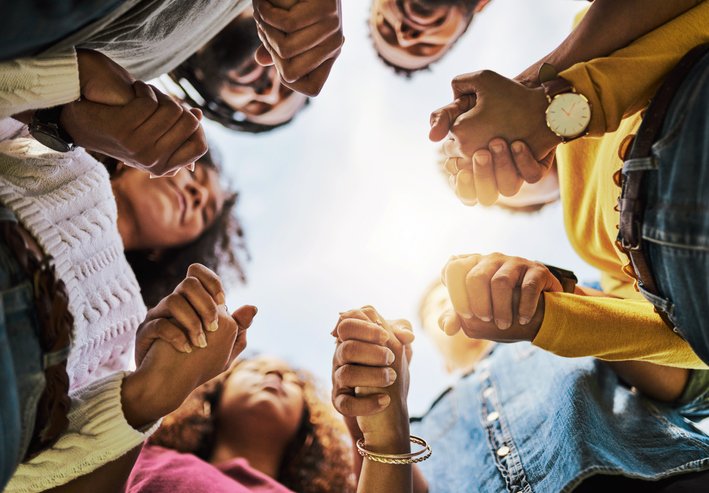Grief Support Groups: Get to Know the Positives and the Pitfalls
Are you considering joining a grief support group? Maybe it’s something that you’ve thought about but are just now considering seriously. Or perhaps finding a bereavement group was suggested to you by friends, family members, or your pastor.
No matter whose idea it was, joining a group that provides bereavement support can be an important part of the grief recovery process. However, before you jump in, it’s good to know about the pros and cons. In the following article, we’ll explore some of the positives and pitfalls of grief support groups.

One of the greatest benefits of grief support groups is that they’re often free.
If you need a low-cost way to process your sorrow in a supportive setting, a grief support group might be a good fit for you. Unlike more costly, private therapy, bereavement groups are often led by volunteer laypersons or peers. The meetings are held at churches or local community groups. If you’re open to sharing your feelings with your peers and receiving support from others who get your experience, a bereavement group may be right for you.
Support groups provide you with a community who “get” your pain.
This can be very beneficial to the grieving process. In many areas, there are often groups for almost everyone, in every situation. Some groups provide support around grief in general, while others are more focused. If you are a widow or widower, for example, it can be helpful to hear how others are coping with the death of a spouse. Regardless of the focus, a bereavement support group can be a great place to make connections, be understood, and get help with your grief.
Grief support groups also can help combat loneliness.
Grief can be very isolating, both emotionally and physically. Perhaps your family members are pushing you to leave your home more. Even if you want to, you may be afraid that you’ll bring everyone down or even feel guilty about having fun without your loved one. If you find a support group that meets regularly, you’ll know when you’re going to leave the house. You’ll be motivated to go because you know you’re headed to a safe place where you can come as you are. You can cry or laugh as you reminisce or share your story, or just sit quietly. Grief support groups are designed to provide dependable, judgment-free spaces for those who need it.
If you need encouragement finding healthier ways to grieve your loss, bereavement groups can help.
You’ll hear ideas and coping strategies that you maybe didn’t think of before. Perhaps birthdays and anniversaries usually may make you want to hide deep under your bed covers all day. A support group might show you a new way to honor your loved one on these special days, such as making a small donation to a charity that was meaningful to them. A grief support group can help you to discover positive ways to move through challenging days.
Although finding group grief support can be helpful, there are also potential pitfalls to be mindful of.
For example, not every group is right for each individual. And, even if it’s a good fit, it may take time for you to warm up to a particular group. Sharing your grieving process with others is a practice in trust and vulnerability. This may be something you aren’t ready for right away. Your grief recovery will have its own timeline. Always honor where you’re at, knowing that you can try again when you’re truly ready.
Another potential drawback of attending a bereavement group can be the other participants.
For example, there may be an individual who hogs the spotlight with his or her own story of grief. There may be a person (or more) always at the ready with bad or unhelpful advice. The group leader may be unskilled in moderating groups or redirecting individuals. In some cases, you may feel as if a bereavement group is pushing you to move on when you aren’t ready. Conversely, if you’re seeking group grief counseling to help you move through the grieving process, being in a group that dwells on sadness can be counterproductive. In this situation, it may be best to seek out a new group.
Despite their pluses and minuses, it’s important to secure bereavement support when you need it.
In a culture that avoids talking about death and loss, finding an outlet for your pain is critical. Group therapy can be a low-cost, welcoming way to take care of yourself in your grief. If you’re looking for a support group near you, there are resources. Consider using a website such as GriefShare.org, or asking trusted church congregation and community leaders for assistance.
At Batchelor Brothers Funeral services, we have extensive after-care resources at our disposal. We would be honored to help you locate a group that meets your needs. Please contact us if you need assistance.
About Batchelor Brothers Funeral Services: As a leading African American-owned and operated funeral and cremation organization serving three states, Batchelor Brothers Funeral Services has provided a ministry of care to thousands of grieving families. We promise to provide our highest level of distinguished service and respect to families who entrust us to honor their loved one. In all aspects of the funeral process, we strive to be the absolute best and are honored to help preserve our clients’ legacies for future generations. With two convenient locations serving North and West Philadelphia, as well as Drexel Hill, it is always our pleasure to be of service. Please visit our website for more information.






Comments